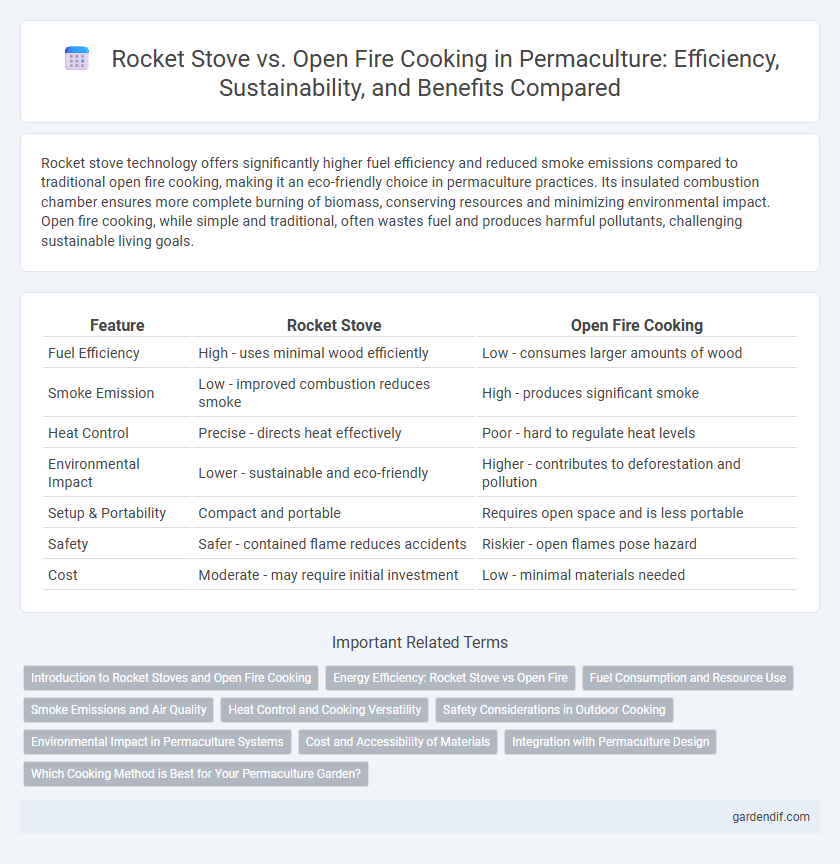
Rocket Stove vs Open Fire Cooking Illustration
Rocket stove technology offers significantly higher fuel efficiency and reduced smoke emissions compared to traditional open fire cooking, making it an eco-friendly choice in permaculture practices. Its insulated combustion chamber ensures more complete burning of biomass, conserving resources and minimizing environmental impact. Open fire cooking, while simple and traditional, often wastes fuel and produces harmful pollutants, challenging sustainable living goals.
Table of Comparison
| Feature | Rocket Stove | Open Fire Cooking |
|---|---|---|
| Fuel Efficiency | High - uses minimal wood efficiently | Low - consumes larger amounts of wood |
| Smoke Emission | Low - improved combustion reduces smoke | High - produces significant smoke |
| Heat Control | Precise - directs heat effectively | Poor - hard to regulate heat levels |
| Environmental Impact | Lower - sustainable and eco-friendly | Higher - contributes to deforestation and pollution |
| Setup & Portability | Compact and portable | Requires open space and is less portable |
| Safety | Safer - contained flame reduces accidents | Riskier - open flames pose hazard |
| Cost | Moderate - may require initial investment | Low - minimal materials needed |
Introduction to Rocket Stoves and Open Fire Cooking
Rocket stoves are energy-efficient cooking devices designed to burn small-diameter wood fuel at high temperatures with minimal smoke, making them ideal for sustainable permaculture practices. Open fire cooking relies on traditional methods of burning wood or biomass, often resulting in higher fuel consumption and increased smoke emissions. Adopting rocket stoves reduces environmental impact by optimizing combustion and conserving resources, while maintaining effective cooking performance in outdoor and off-grid settings.
Energy Efficiency: Rocket Stove vs Open Fire
Rocket stoves optimize energy efficiency by directing heat through an insulated combustion chamber, resulting in higher fuel combustion rates and less smoke compared to open fire cooking. This design reduces fuel consumption by up to 50% while maintaining consistent high temperatures necessary for effective cooking. Open fires, in contrast, lose significant heat to the environment, leading to greater fuel usage and increased emissions.
Fuel Consumption and Resource Use
Rocket stoves use significantly less fuel than open fire cooking by maximizing combustion efficiency and directing heat to the cooking vessel, reducing wood consumption by up to 50%. Their insulated design minimizes heat loss and allows for effective use of small-diameter branches, twigs, and agricultural waste, promoting sustainable resource use in permaculture systems. In contrast, open fires have higher fuel requirements and generate more smoke and emissions, leading to greater environmental impact and resource depletion.
Smoke Emissions and Air Quality
Rocket stoves produce significantly less smoke emissions compared to open fire cooking, enhancing indoor and outdoor air quality by using efficient combustion of biomass. The high combustion temperature in rocket stoves reduces particulate matter and harmful gases, lowering respiratory health risks commonly associated with traditional open fires. Implementing rocket stove technology in permaculture settings promotes sustainable cooking practices aligned with environmental health standards.
Heat Control and Cooking Versatility
Rocket stoves provide superior heat control through efficient combustion chambers that concentrate heat, allowing precise temperature regulation compared to open fire cooking. Open fires often produce uneven heat and are difficult to adjust, limiting cooking versatility for delicate dishes or slow simmering. The focused design of rocket stoves makes them ideal for varied cooking techniques, including boiling, grilling, and frying, enhancing overall energy efficiency in permaculture practices.
Safety Considerations in Outdoor Cooking
Rocket stoves offer enhanced safety in outdoor cooking by containing flames within an insulated combustion chamber, reducing the risk of accidental burns and uncontrolled fires compared to open fire cooking. Their efficient fuel combustion minimizes smoke emission, decreasing respiratory hazards and improving overall air quality around the cooking area. In contrast, open fires present greater exposure to sparks and embers, increasing the likelihood of fire spread and injury in permaculture settings.
Environmental Impact in Permaculture Systems
Rocket stove technology dramatically reduces fuel consumption and carbon emissions compared to open fire cooking, making it a sustainable choice in permaculture systems. Its efficient combustion minimizes smoke and particulate pollution, improving air quality and protecting surrounding plant and animal life. By conserving biomass resources and lowering deforestation risks, rocket stoves support ecological balance and long-term soil health within permaculture environments.
Cost and Accessibility of Materials
Rocket stoves offer significant cost savings by using inexpensive, locally sourced materials like clay, bricks, and metal scraps, making them highly accessible for permaculture practitioners. Open fire cooking requires minimal investment but often demands firewood, which may not be sustainably available or cost-effective in all regions. The efficient fuel use of rocket stoves reduces ongoing expenses, enhancing accessibility for communities focused on eco-friendly permaculture solutions.
Integration with Permaculture Design
Rocket stoves maximize fuel efficiency and minimize smoke emissions, aligning with permaculture principles of sustainability and resource conservation. Their compact design reduces biomass consumption and preserves surrounding ecosystems, unlike open fire cooking that often leads to deforestation and soil degradation. Integrating rocket stoves into permaculture systems enhances energy-efficient food preparation while maintaining ecological balance and soil health.
Which Cooking Method is Best for Your Permaculture Garden?
Rocket stoves offer efficient fuel use and minimal smoke production, making them ideal for sustainable cooking in permaculture gardens where conserving resources is crucial. Open fire cooking provides versatile heat control and traditional flavor, but consumes more wood and generates greater pollution, impacting garden air quality. Choosing the best method depends on balancing energy efficiency, environmental impact, and cooking style preferences within your permaculture system.
Rocket Stove vs Open Fire Cooking Infographic

 gardendif.com
gardendif.com